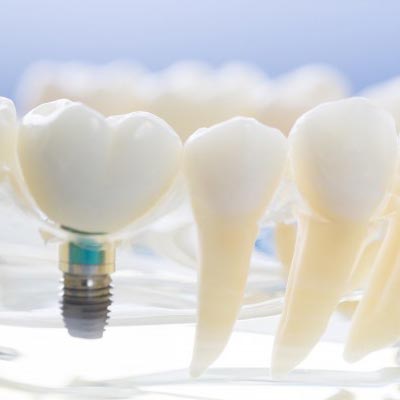Australians aged 15 and over have an average of 12.8 decayed, missing or filled teeth. This statistic proves we aren’t paying our teeth the attention they deserve. So what happens if a severely decayed tooth needs removing or you suffer from missing teeth? If not replaced, your surrounding teeth can quickly move into the missing spot and your jaw bone can break down, causing an uneven bite. Missing teeth can also affect your lifestyle by causing you to avoid hard foods and feel uncomfortable about your appearance. Whilst there are many options to consider to replace missing teeth, due to their high success rate, more patients are choosing dental implants.
What are dental implants?
Simply put, a dental implant is an artificial tooth. But unlike removable dentures, dental implants are permanently fixed into your jaw bone beneath your gums. A titanium screw-like post supports the fixture of a tooth-shaped dental crown to create an artificial yet natural-looking tooth.
When would I need dental implants?
There are a few reasons why you might need dental implants:
- You have missing or severely broken teeth
- You’re looking for a more permanent solution to removable dentures
- A severe gum infection (known as periodontitis) has caused the need for one or more teeth to be removed.
Despite your reason for needing dental implants, replacing missing teeth quickly can help restore good oral health. And help you reclaim an aesthetically pleasing smile and reduce any risk of future dental problems.
What does the procedure involve?
After placing you under a local anaesthetic, your dentist will carefully remove the damaged tooth and, if necessary, prepare the jawbone for grafting—occasionally needed to restore or rebuild the underlying bone. There are two phases in the dental implant procedure to allow your mouth time to heal between appointments.
Phase one: Placing the implant.
Your dentist will place the implant post in your jaw which acts as your artificial tooth’s root. A healing cap is then placed over the dental implant to help support your gum tissue to heal around the implant site. Once placed, it can take several months for the jaw bone to integrate with the dental implant to create a solid base for your new tooth.
Phase two: Attaching the crown.
When your bone has successfully connected to the implant (typically after a period of four months), your dentist will take impressions of your mouth and remaining teeth. They’ll then use them to make your crown—your new natural-looking artificial tooth.
Are dental implants right for me?
Although the process takes time, the results are worth the wait. But before you commit to dental implants, there are factors you should consider before booking an appointment:
- If you take osteoporosis medication, let your dentist know. Osteoporosis affects the health of your bones so your dentist will likely refer to your medical history to make a recommendation if implants are suitable for you.
- Patients with Type 1 or Type 2 diabetes are at a higher risk of infection of the implant site and may experience a longer healing period. Whilst still an option to replace missing teeth, you may require pre and post implant care to minimise the risk of failure.
- If you smoke, it’s likely your dentist will recommend that you break the habit to allow the implant to fuse to your jaw bone. The nicotine in cigarettes is proven to reduce blood flow, especially around the mouth. Slow circulation of blood to the treatment area can slow down or even prevent your mouth from healing. Therefore, smokers are at high risk of implant failure.
- To be considered for dental implants, you must have a fully developed jaw. This means that children under the age of 18 aren’t suitable candidates for implants.
All things considered, if you’re well, have healthy gums and strong jawbones, it’s likely that you’re a good candidate for dental implants. If you’re still unsure if dental implants are right for you, contact our team at Whites Dental Care for a free implant consultation.



